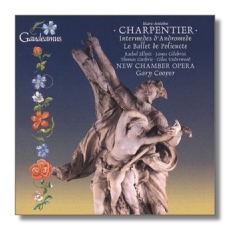
The Internet's Premier Classical Music Source
Related Links
- M.A. Charpentier Reviews
- Latest Reviews
- More Reviews
-
By Composer
-
Collections
DVD & Blu-ray
Books
Concert Reviews
Articles/Interviews
Software
Audio
Search Amazon
Recommended Links
Site News
 CD Review
CD Review
Marc-Antoine Charpentier

- Andromède
- Le ballet de Polieucte
Rachel Elliott, soprano
James Gilchrist, tenor
Thomas Guthrie, baritone
Giles Underwood, bass
The Band of Instruments
New Chamber Orchestra/Gary Cooper
Academy Sound & Vision Gaudeamus CDGAU303 DDD 65:31
Corneille's 1650 drama Andromède was revived in Paris in 1682, this time with music by Marc-Antoine Charpentier. Charpentier wrote so much music – nearly 45 minutes on this recording – that Andromède must have seemed more like an opera than a spoken drama with incidental music. Perhaps this was entirely intentional, as Lully's operatic version of this story (Persée), was newly-premièred at the time of Andromède's revival.
The plot of Andromède is too complicated to go into here; suffice it to say that it is typical for its period. Louis the Sun King is lauded in the context of a mythological story – that of Andromeda, rescued from her sacrificial rock by Perseus and his winged steed Pegasus. True love is given its heavenly reward, and Perseus and Andromeda rise up to live among the gods. (And indeed, we need only to look at the night sky to see them there.)
For those who know Charpentier's theatrical music, Andromède will present no surprises. Nevertheless, the music is uniformly attractive and consistent with the elevated moral tone and nobility of the drama. Music from all five acts is presented. Charpentier's writing for the male trio, who plays the role of chorus, is particularly fine.
The CD's remaining twenty-two minutes are devoted to Le ballet de Polieucte. This too is based on a drama by Corneille, intended for production by the French Jesuit college of Harcourt. It appears that Charpentier took at least some of the music for Polieucte from earlier works – not such an uncommon practice at the time. In contrast to Andromède, all twelve dances (plus the Overture) are non-vocal. The story is hinted by titles such as "Profane Love: Games and Pleasures," "Love's Blacksmiths," and "Why has the tender heart not returned?"
Gary Cooper's New Chamber Opera, with its associated Band of Instruments, is a relatively new outfit, but one that already has made a mark in reviving seventeenth- and eighteenth-century works. (They play modern works too.) Cooper's approach is sweeter and less acerbic than that of many of his contemporaries. Even the period instruments used are distinguished by their mellow sound. The four vocalists have a firm grasp on the necessary style, and sing with firmness but not with heaviness.
AS&V's booklet provides, in addition to an excellent essay by John S. Powell (whose guidance assisted me in the preparation of this review), French texts and English translations. The recording was made in New College Chapel, Oxford, and is probably a lot more intimate in its impact than the 1682 production must have been!
Copyright © 2002, Raymond Tuttle


















